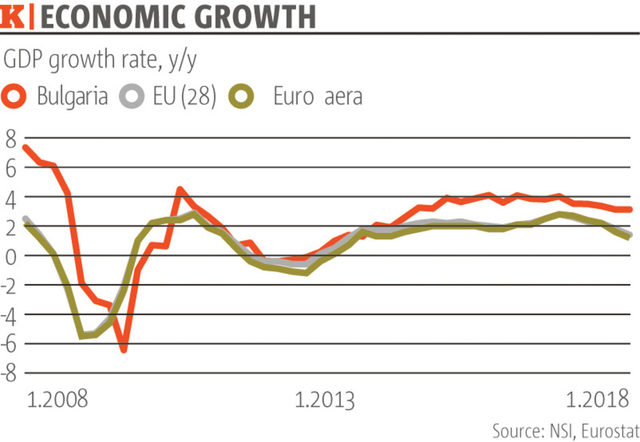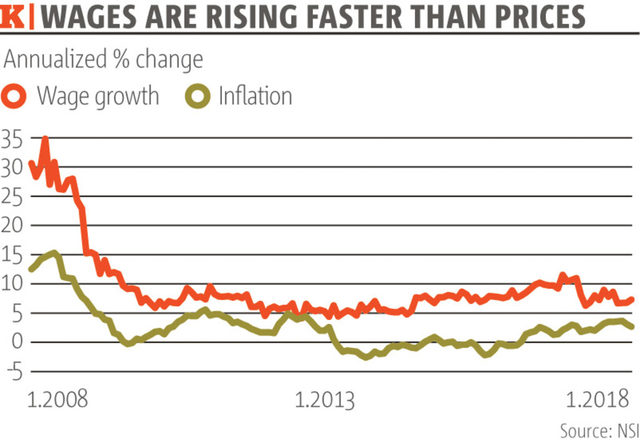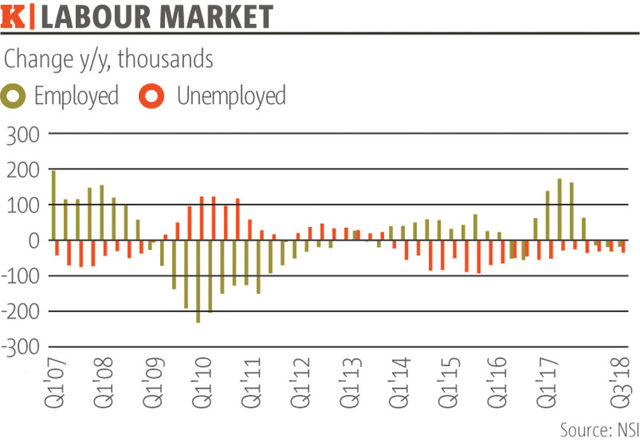In the spring of 2018, optimists among macroeconomic analysts predicted that economic growth in the euro area would remain close to the 2.4% rate of 2017. A year later, the forecast seems to have shifted significantly. Germany is stagnating, which is actually good news compared to the alternative - a technical recession, whereas Italy is officially in recession after two consecutive quarters of negative growth.
Against this increasingly pessimistic European background, the Bulgarian economy grew at a decent annualized rate of 3.1% in the last three months of 2018 - the same increase as in the previous quarter. The good news is that the country is not among the 11 EU member states where growth rates decreased. On the other hand, the pace remains far below the growth of close to 4% in 2017. Moreover, express data from the National Statistical Institute show the slowdown is coming from weak investment and consumer activity, which were the main growth engines in previous quarters. It's still too early for definitive annual data, but currently, the probability of a growth rate of over 3.5%, as reported in the previous three years, is slim.
What goes up ...
In the last quarter of 2018, the pace of economic growth in Europe slowed to a five-year low. The growth rate of the gross domestic product in the EU fell to 1.4% on an annual comparison basis, and in the euro area, it dropped to 1.2%. In comparison, in 2017 GDP across the economic bloc rose by 2.4% - the highest increase in a decade. "At that time, economic growth was well above the potential of the European economy and it was clear that, sooner or later, it would return to more sustainable levels of about 1%," says Zsolt Darvas, a Senior Fellow at the Brussels-based economic research institute Bruegel.
A number of international institutions have already cut their forecasts for Europe. For example, the European Commission decreased its growth expectations by 0.3 percentage points to 1.3% in 2019. Experts at the OECD and London-based think-tank Capital Economics also expect a slowdown in the coming two years. There are also moderate optimists, however. "Car production has started to recover in December, suggesting that this disruption will be short-lived. Also, inflation looks set to slow, raising households' spending power. As a result, we think that quarterly GDP growth will increase from 0.2% in Q3 and Q4 2018 to about 0.3% this year," said Jack Allen, senior economist for Europe at Capital Economics.
Overall, of the countries that have published express data for October - December 2018, only five economies accelerated, three kept the same pace as in the previous quarter, and the remaining 11 reported lower growth rates, including major trading partners of Bulgaria such as Germany, Austria and Italy.
The consequences for Bulgaria
The bigger European economies drag the smaller ones along for the ride, in both good and bad times. A slowdown in Western Europe is bound to affect Central and Eastern Europe as well because the region is very dependent on advanced economies for exports and industry.
Germany and Italy are Bulgaria's biggest export markets in the EU with sales of Bulgarian goods totalling 12.1 billion levs between January and November last year. Though the slowdown in the Western economies has yet to impact Bulgarian exports, the country's economy is losing steam. Consumption growth - the main economic engine, slowed down from 6.9% in the third quarter to 5.3% in the period October - December. According to Desislava Nikolova, chief economist at Sofia-based think-tank Institute for Market Economics (IME), the slowdown came from inflation, which peaked at 3.7% in October and has since fallen to more moderate levels.
More worrying is the slowdown in investment activity, whereby the pace of growth dropped by 3 percentage points to 4% on an annual comparison basis in the last three months of the year. Initially, forecasters were betting on an acceleration coming from EU funding and higher government capital expenses. Nikolova says that bad weather conditions could explain the weak data at the end of 2018. Some analysts are betting that investment activity will accelerate later this year. The deadline of the current EU programming period for funding is looming in 2020, and the government allocated over 1.8 bn levs last year for dam repairs and the Hemus highway construction. Having said that, it would not be surprising if the bigger part of the money flows in at the last possible minute of the programming period - in 2022, as was the case in the previous period.
Another warning light flashed in the labour market, where the number of economically inactive people - those not in employment or looking for work, rose by 1,100 in the fourth quarter compared to the same period of 2017. The number of employed is down by 18,700, mainly because of younger cohorts. "All indicators show that the labour market has reached a peak and from now on positive changes are unlikely in the absence of significant developments in investment activity or the general economic environment," says Yavor Alexiev, senior economist at IME.
A risky year ahead
"It should be noted that 2019 begins with greater risks for the economy compared to last year. While a few months ago we were hoping that GDP growth would reach close to 4% in 2019, now a rate of 3% would be a cause for celebration," says Desislava Nikolova. She claims that some of the outside challenges could be trade wars, Brexit uncertainty and the recession in Italy. On the other hand, optimists in Brussels, for example, are betting on a growth rate of 3.6% for the Bulgarian economy this year (3.2% in 2018). Though more conservative, the IMF also predicts a slight acceleration to 3.3% in 2019 from an estimated 3.2% last year.



In the spring of 2018, optimists among macroeconomic analysts predicted that economic growth in the euro area would remain close to the 2.4% rate of 2017. A year later, the forecast seems to have shifted significantly. Germany is stagnating, which is actually good news compared to the alternative - a technical recession, whereas Italy is officially in recession after two consecutive quarters of negative growth.
Against this increasingly pessimistic European background, the Bulgarian economy grew at a decent annualized rate of 3.1% in the last three months of 2018 - the same increase as in the previous quarter. The good news is that the country is not among the 11 EU member states where growth rates decreased. On the other hand, the pace remains far below the growth of close to 4% in 2017. Moreover, express data from the National Statistical Institute show the slowdown is coming from weak investment and consumer activity, which were the main growth engines in previous quarters. It's still too early for definitive annual data, but currently, the probability of a growth rate of over 3.5%, as reported in the previous three years, is slim.












